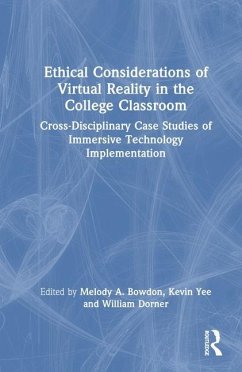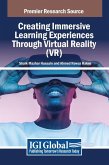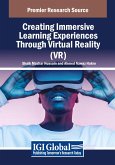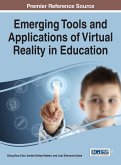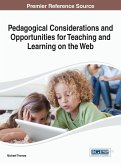Ethical Considerations of Virtual Reality in the College Classroom
Cross-Disciplinary Case Studies of Immersive Technology Implementation
Herausgeber: Bowdon, Melody; Dorner, William; Yee, Kevin
Ethical Considerations of Virtual Reality in the College Classroom
Cross-Disciplinary Case Studies of Immersive Technology Implementation
Herausgeber: Bowdon, Melody; Dorner, William; Yee, Kevin
- Gebundenes Buch
- Merkliste
- Auf die Merkliste
- Bewerten Bewerten
- Teilen
- Produkt teilen
- Produkterinnerung
- Produkterinnerung
Ethical Considerations of Virtual Reality in the College Classroom collects case studies that address both pedagogical and ethical foundations of extended reality tools in postsecondary learning environments across disciplines.
Andere Kunden interessierten sich auch für
![Virtual Reality in Curriculum and Pedagogy Virtual Reality in Curriculum and Pedagogy]() Erica SouthgateVirtual Reality in Curriculum and Pedagogy171,99 €
Erica SouthgateVirtual Reality in Curriculum and Pedagogy171,99 €![Creating Immersive Learning Experiences Through Virtual Reality (VR) Creating Immersive Learning Experiences Through Virtual Reality (VR)]() Creating Immersive Learning Experiences Through Virtual Reality (VR)264,99 €
Creating Immersive Learning Experiences Through Virtual Reality (VR)264,99 €![Creating Immersive Learning Experiences Through Virtual Reality (VR) Creating Immersive Learning Experiences Through Virtual Reality (VR)]() Creating Immersive Learning Experiences Through Virtual Reality (VR)202,99 €
Creating Immersive Learning Experiences Through Virtual Reality (VR)202,99 €![Emerging Tools and Applications of Virtual Reality in Education Emerging Tools and Applications of Virtual Reality in Education]() Emerging Tools and Applications of Virtual Reality in Education166,99 €
Emerging Tools and Applications of Virtual Reality in Education166,99 €![Pedagogical Considerations and Opportunities for Teaching and Learning on the Web Pedagogical Considerations and Opportunities for Teaching and Learning on the Web]() Pedagogical Considerations and Opportunities for Teaching and Learning on the Web161,99 €
Pedagogical Considerations and Opportunities for Teaching and Learning on the Web161,99 €![Ethical Leadership and Decision Making in Education Ethical Leadership and Decision Making in Education]() Joan Poliner ShapiroEthical Leadership and Decision Making in Education168,99 €
Joan Poliner ShapiroEthical Leadership and Decision Making in Education168,99 €![Fundamental Considerations in Technology Mediated Language Assessment Fundamental Considerations in Technology Mediated Language Assessment]() Fundamental Considerations in Technology Mediated Language Assessment153,99 €
Fundamental Considerations in Technology Mediated Language Assessment153,99 €-
-
-
Ethical Considerations of Virtual Reality in the College Classroom collects case studies that address both pedagogical and ethical foundations of extended reality tools in postsecondary learning environments across disciplines.
Produktdetails
- Produktdetails
- Verlag: Routledge
- Seitenzahl: 368
- Erscheinungstermin: 22. Dezember 2023
- Englisch
- Abmessung: 235mm x 157mm x 24mm
- Gewicht: 683g
- ISBN-13: 9781032354286
- ISBN-10: 1032354283
- Artikelnr.: 69029923
- Herstellerkennzeichnung
- Libri GmbH
- Europaallee 1
- 36244 Bad Hersfeld
- gpsr@libri.de
- Verlag: Routledge
- Seitenzahl: 368
- Erscheinungstermin: 22. Dezember 2023
- Englisch
- Abmessung: 235mm x 157mm x 24mm
- Gewicht: 683g
- ISBN-13: 9781032354286
- ISBN-10: 1032354283
- Artikelnr.: 69029923
- Herstellerkennzeichnung
- Libri GmbH
- Europaallee 1
- 36244 Bad Hersfeld
- gpsr@libri.de
Melody Bowdon is Professor and Director of Graduate Programs in the Department of Writing and Rhetoric at the University of Central Florida, USA. Kevin Yee is Director of the Faculty Center for Teaching & Learning at the University of Central Florida, USA. William Dorner is XML Developer/Analyst and former Instructional Specialist at the University of Central Florida, USA.
Section One: Introduction 1. Exploring the Intersection of Pedagogy and
Ethics in the use of VR/XR in Higher Education 2. Extended Reality,
Pedagogy, and the Ethics of Embodiment Section Two: The Case Studies 3.
Teaching Conscientious Design: How Learning VR Development Can Lead to
Greater Understanding of Sustainability 4. Virtual Reality Technology in
Norwegian Teacher Education: Creating an Innovative Experience or Another
Academic Elite? 5. Technology Sunset, Can We Pivot? by Eileen Grodziak,
Kathleen Morgan, and Amy Kuntz 6. Building Student Capacity and
Disciplinary Identity in an Immersive Media Course at a Small Liberal Arts
College 7. Enacting Equity and Ethics through VR in the Public Speaking
Classroom: The Virtual Martin Luther King Project 8. Using Virtual Reality
to Immerse Students in the Middle Passage: Ethics, Challenges, and Benefits
9. Virtual Perception and the Accessible Implementation of VR/AR Technology
in Psychology Education 10. A Virtual Reality App Created with CoSpaces:
Student Perceptions and Attitudes 11. Access and Opportunity: Removing
Barriers to a Discipline through Virtual Field Work 12. Conemaugh River
Immersive Experience: A 360° Virtual Biology Field Trip 13. Pros, Cons, and
Considerations of Implementing Live Virtual Reality in Medical Education
14. Digital Dinosaurs: Bringing Dinosaurs Back to Life with VR/AR in the
College Classroom 15. Ethical Considerations in Using Virtual Reality to
Support Competency-Based Education in Social Work 16. Mission, Morals and
the Metaverse: How Morehouse College is Transforming Undergraduate
Education in the Sciences and Humanities with Virtual Reality Section
Three: Further Explorations 17. Boundaries, Informed Consent, and Learning
18. Post-Qualitative Virtuality: Assembling Reality as New Material for
Teaching and Learning by Eleanor Dare 19. Ethical, Moral, and Philosophical
Challenges of Creating and Evaluating the Impact of Virtual Reality
Experiences
Ethics in the use of VR/XR in Higher Education 2. Extended Reality,
Pedagogy, and the Ethics of Embodiment Section Two: The Case Studies 3.
Teaching Conscientious Design: How Learning VR Development Can Lead to
Greater Understanding of Sustainability 4. Virtual Reality Technology in
Norwegian Teacher Education: Creating an Innovative Experience or Another
Academic Elite? 5. Technology Sunset, Can We Pivot? by Eileen Grodziak,
Kathleen Morgan, and Amy Kuntz 6. Building Student Capacity and
Disciplinary Identity in an Immersive Media Course at a Small Liberal Arts
College 7. Enacting Equity and Ethics through VR in the Public Speaking
Classroom: The Virtual Martin Luther King Project 8. Using Virtual Reality
to Immerse Students in the Middle Passage: Ethics, Challenges, and Benefits
9. Virtual Perception and the Accessible Implementation of VR/AR Technology
in Psychology Education 10. A Virtual Reality App Created with CoSpaces:
Student Perceptions and Attitudes 11. Access and Opportunity: Removing
Barriers to a Discipline through Virtual Field Work 12. Conemaugh River
Immersive Experience: A 360° Virtual Biology Field Trip 13. Pros, Cons, and
Considerations of Implementing Live Virtual Reality in Medical Education
14. Digital Dinosaurs: Bringing Dinosaurs Back to Life with VR/AR in the
College Classroom 15. Ethical Considerations in Using Virtual Reality to
Support Competency-Based Education in Social Work 16. Mission, Morals and
the Metaverse: How Morehouse College is Transforming Undergraduate
Education in the Sciences and Humanities with Virtual Reality Section
Three: Further Explorations 17. Boundaries, Informed Consent, and Learning
18. Post-Qualitative Virtuality: Assembling Reality as New Material for
Teaching and Learning by Eleanor Dare 19. Ethical, Moral, and Philosophical
Challenges of Creating and Evaluating the Impact of Virtual Reality
Experiences
Section One: Introduction 1. Exploring the Intersection of Pedagogy and
Ethics in the use of VR/XR in Higher Education 2. Extended Reality,
Pedagogy, and the Ethics of Embodiment Section Two: The Case Studies 3.
Teaching Conscientious Design: How Learning VR Development Can Lead to
Greater Understanding of Sustainability 4. Virtual Reality Technology in
Norwegian Teacher Education: Creating an Innovative Experience or Another
Academic Elite? 5. Technology Sunset, Can We Pivot? by Eileen Grodziak,
Kathleen Morgan, and Amy Kuntz 6. Building Student Capacity and
Disciplinary Identity in an Immersive Media Course at a Small Liberal Arts
College 7. Enacting Equity and Ethics through VR in the Public Speaking
Classroom: The Virtual Martin Luther King Project 8. Using Virtual Reality
to Immerse Students in the Middle Passage: Ethics, Challenges, and Benefits
9. Virtual Perception and the Accessible Implementation of VR/AR Technology
in Psychology Education 10. A Virtual Reality App Created with CoSpaces:
Student Perceptions and Attitudes 11. Access and Opportunity: Removing
Barriers to a Discipline through Virtual Field Work 12. Conemaugh River
Immersive Experience: A 360° Virtual Biology Field Trip 13. Pros, Cons, and
Considerations of Implementing Live Virtual Reality in Medical Education
14. Digital Dinosaurs: Bringing Dinosaurs Back to Life with VR/AR in the
College Classroom 15. Ethical Considerations in Using Virtual Reality to
Support Competency-Based Education in Social Work 16. Mission, Morals and
the Metaverse: How Morehouse College is Transforming Undergraduate
Education in the Sciences and Humanities with Virtual Reality Section
Three: Further Explorations 17. Boundaries, Informed Consent, and Learning
18. Post-Qualitative Virtuality: Assembling Reality as New Material for
Teaching and Learning by Eleanor Dare 19. Ethical, Moral, and Philosophical
Challenges of Creating and Evaluating the Impact of Virtual Reality
Experiences
Ethics in the use of VR/XR in Higher Education 2. Extended Reality,
Pedagogy, and the Ethics of Embodiment Section Two: The Case Studies 3.
Teaching Conscientious Design: How Learning VR Development Can Lead to
Greater Understanding of Sustainability 4. Virtual Reality Technology in
Norwegian Teacher Education: Creating an Innovative Experience or Another
Academic Elite? 5. Technology Sunset, Can We Pivot? by Eileen Grodziak,
Kathleen Morgan, and Amy Kuntz 6. Building Student Capacity and
Disciplinary Identity in an Immersive Media Course at a Small Liberal Arts
College 7. Enacting Equity and Ethics through VR in the Public Speaking
Classroom: The Virtual Martin Luther King Project 8. Using Virtual Reality
to Immerse Students in the Middle Passage: Ethics, Challenges, and Benefits
9. Virtual Perception and the Accessible Implementation of VR/AR Technology
in Psychology Education 10. A Virtual Reality App Created with CoSpaces:
Student Perceptions and Attitudes 11. Access and Opportunity: Removing
Barriers to a Discipline through Virtual Field Work 12. Conemaugh River
Immersive Experience: A 360° Virtual Biology Field Trip 13. Pros, Cons, and
Considerations of Implementing Live Virtual Reality in Medical Education
14. Digital Dinosaurs: Bringing Dinosaurs Back to Life with VR/AR in the
College Classroom 15. Ethical Considerations in Using Virtual Reality to
Support Competency-Based Education in Social Work 16. Mission, Morals and
the Metaverse: How Morehouse College is Transforming Undergraduate
Education in the Sciences and Humanities with Virtual Reality Section
Three: Further Explorations 17. Boundaries, Informed Consent, and Learning
18. Post-Qualitative Virtuality: Assembling Reality as New Material for
Teaching and Learning by Eleanor Dare 19. Ethical, Moral, and Philosophical
Challenges of Creating and Evaluating the Impact of Virtual Reality
Experiences

